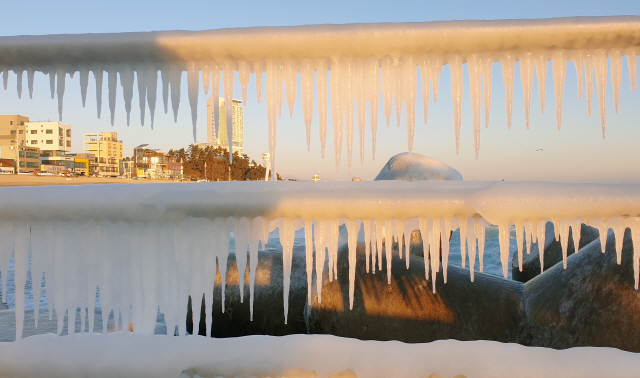First Han River ice observation this winter
The highest temperature in the daytime is -9~1 degrees…Snow in Jeju and the west coast
Arctic cold waves lead to’negative arctic vibration’ caused by warming
 viewer
viewer
Even the Han River froze in a cold wave from the Arctic.
The Meteorological Administration announced that ice on the Han River was observed for the first time in this winter on the morning of the 9th. This is four days earlier than normal, and because last year was not frozen due to warmer weather than usual, it is the freezing that appeared after two years.
The minimum temperature in the morning in Seoul on this day was -16.6 degrees Celsius. The observation of freezing of the Han River began in 1906 and is based on the vicinity of the Hangang Bridge in Noryangjin. Noryangjin (then Nodeul Naru) was one of the main naru of the Han River and was chosen as the reference point for observation because it is the best approach for observation.
When the band-shaped area around 100m upstream of the second and fourth piers of the Hangang Bridge is completely covered with ice, it is judged as freezing when the river cannot be seen. If the frozen water surface melts and does not refreeze because any part of it is exposed, it is considered to have melted.
The average annual price of ice on the Han River is January 13 and the sea ice is January 30. Since observation, the fastest freezing of the Han River was December 3, 1934, and the latest was February 13, 1964. There are eight years in which the Han River ice was not observed: 1960, 1971, 1972, 1978, 1988, 1991, 2006, and 2019.
This morning, the minimum temperature is expected to be around -20 degrees for central and Gyeongbuk inland, for Jeonbuk inland and around -10 degrees for other regions. As of 5 a.m. on that day, the temperature in major regions across the country is -16.0 degrees in Seoul, -14.6 degrees in Incheon, -18.3 degrees in Suwon, -20.5 degrees in Chuncheon, -12.3 degrees in Gangneung, -15.1 degrees in Cheongju, -15.8 degrees in Daejeon, -14.3 degrees in Jeonju. , Gwangju -10.5 degrees, Jeju 0.1 degrees, Daegu -11.1 degrees, Busan -9.4 degrees, Ulsan -10.5 degrees, Changwon -11.7 degrees.
The highest temperature during the day was forecast to be -9 to 1 degrees. It will be generally sunny, but the west coast of Chungnam, the western part of the Jeolla region, and Jeju Island are cloudy and sometimes snow will fall. By the 10th, the estimated snow cover is 5 to 20 cm in Jeju Island, Ulleungdo Island and Dokdo Island, 1 to 5 cm in the west coast of Jeolla-do, the west coast in Chungnam, and 5 in the West Sea, and around 1 cm in the Jeolla area (excluding the west coast).
The reason for this winter’s record-breaking cold is analyzed as a’negative arctic vibration’ caused by warming. Arctic oscillation is a phenomenon in which the vortex of cold air existing in the North Pole repeats its strength and weakness every tens of days and decades. When the Arctic Vibration Index is turned to negative due to warming in the Arctic, the jet stream in the upper atmosphere weakens and the cold air in the Arctic falls, causing a cold wave in East Asia.
An official from the Meteorological Administration said, “As the cold continues for a long time, we hope that outdoor workers and the elderly, such as screening clinics, will pay special attention to health management so that they do not suffer from low immunity or cold disease.” I am concerned about damage to crops, so please prepare thoroughly for this part.”
/ Reporter Lee Ji Yoon [email protected]
< 저작권자 ⓒ 서울경제, 무단 전재 및 재배포 금지 >
